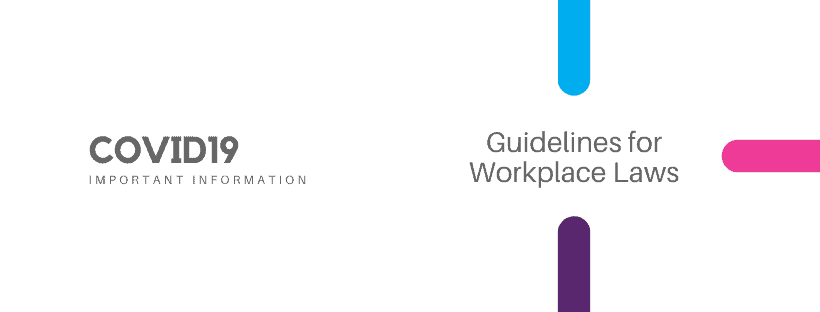Where can I get information on health and safety in the workplace?
• The Australian Government Department of Health
• WA State Public Health Unit
• Safe Work Australia
• WA State workplace health and safety body
• Comcare (Commonwealth) – for Australian government employees.
When can employers’ direct employees to stay away from their usual place of workplace under workplace health and safety laws.
• WA State workplace health and safety body
• The Australian Government Department of Health
What happens if an employee or their family member is sick with Coronavirus?
Employees who are sick with the coronavirus cannot attend the workplace for a period due to the workplace health and safety legal obligations that both employers and employees have.
• Employers can direct employees who are sick with the coronavirus not to come to work and to get medical clearance from a doctor before returning to work.
• Full-time and part-time employees who cannot come to work because they are sick with coronavirus can take paid sick leave.
• If an employee needs to look after a family member or a member of their household who is sick with coronavirus, or suffering an unexpected emergency, they are entitled to take paid carer’s leave.
• An employer cannot require an employee to take sick or carer’s leave.
• However, in these circumstances the employee is not entitled to be paid unless they use their paid leave entitlements.
• From Midnight Sunday the 15th of March 2020, any employee returning from overseas, is required to self-quarantine for 14 days.
What if an employee is stuck overseas or is required to be quarantined or to self-isolate?
Employees should contact their employer immediately if they are unable to attend work because they cannot return from overseas, are required to enter quarantine or to self-isolate because of the coronavirus.
The Fair Work Act does not have specific rules for these kinds of situations so employees and employers need to come to their own arrangement. This may include:
• working from home or another location (if this is a practical option), noting they should review any applicable enterprise agreement, award, employment contracts or workplace policies
• taking sick leave if the employee is sick
• taking annual leave
• taking any other leave available to them (such as long service leave or any other leave available under an award, enterprise agreement or employment contract)
• arranging any other paid or unpaid leave by agreement between the employee and the employer.
What if an employee wants to stay home as a precaution?
Employees who want to stay at home as a precaution need to come to an arrangement with their employer that best suits their workplace, such as making a request to work from home (if this is a practical option) or to take some form of paid or unpaid leave, such as annual leave or long service leave.
Normal leave application processes in the workplace apply. If the employee does not enter into an arrangement with their employer or use paid leave, they are not entitled to payment in these circumstances.
Employees who do not work because they have a reasonable concern about an imminent risk to their health or safety are not taking industrial action. This is provided they are not failing to comply with a direction to perform other appropriate and safe work.
What if an employer wants their employees to stay home as a precaution?
Under workplace health and safety laws, employers must ensure the health and safety of their workers and others at the workplace as far as is reasonably practicable. Workers also have responsibilities under those laws.
Employees can be directed to obtain medical clearance, which may include being tested for coronavirus.
Where an employer directs a full-time or part-time employee not to work due to workplace health and safety risks but the employee is ready, willing and able to work, the employee is generally entitled to be paid while the direction applies. Employers should consider whether their obligations are impacted by any applicable enterprise agreement, award, employees’ employment contracts or workplace policies.
When can employees work from home?
Working from home arrangements are usually agreed between an employer and employee. An employer who wants to direct an employee to work from home should review their obligations under any applicable enterprise agreement, award, employment contract or workplace policy.
Employers should also consider the nature of the work involved and the suitability of the employee’s home. Workplace health and safety laws still apply even when an employee is working from home.
Where employees are required to record their hours of work (for example, in relation to annualised wage arrangements under some modern awards), this needs to continue when they are working from home. Employers and employees are encouraged to discuss how this should occur.
What if I need to let employees go or reduce their working hours?
Some employers may need to make employees’ positions redundant in response to a business downturn. If an employee’s job is made redundant their employer may have to give them redundancy pay. The Fair Work Act has requirements that employers have to meet before they can terminate an employee’s employment, such as providing notice.
If an employer seeks to vary employees’ work rosters, they should review any applicable enterprise agreement, award, employment contracts or workplace policies. Particularly for full- time and part-time employees, an employer is usually required to seek employees’ agreement to change their rosters.





